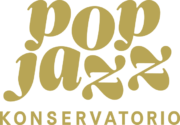Music play school for 0-6 year olds
Music play school is a fun and playful, but also goal-oriented musical activity for 0-6 year olds. Music play school is a fun and playful way to learn the basics of music through singing, chanting, moving, playing, listening and improvising.
Music play school is a musical activity for all children and their adults! You can start at the Pop & Jazz Conservatory as a baby and continue until school age. After that, your child can pursue other musical activities at the Pop & Jazz Conservatory.
The music play school emphasises the joy of making and experiencing music. The Pop & Jazz Conservatory’s music play school takes a student-centred approach to supporting children’s intellectual growth, expression and social skills. Teaching is goal-oriented, progressive music education. The objectives are progressive according to the child’s developmental stage and musical skills. Although there are clear objectives, the most important thing in music class is to explore the world of music in a relaxed and joyful way!
Music play school for children under school age
The Pop & Jazz Conservatory offers music play school for different groups of children of different ages.
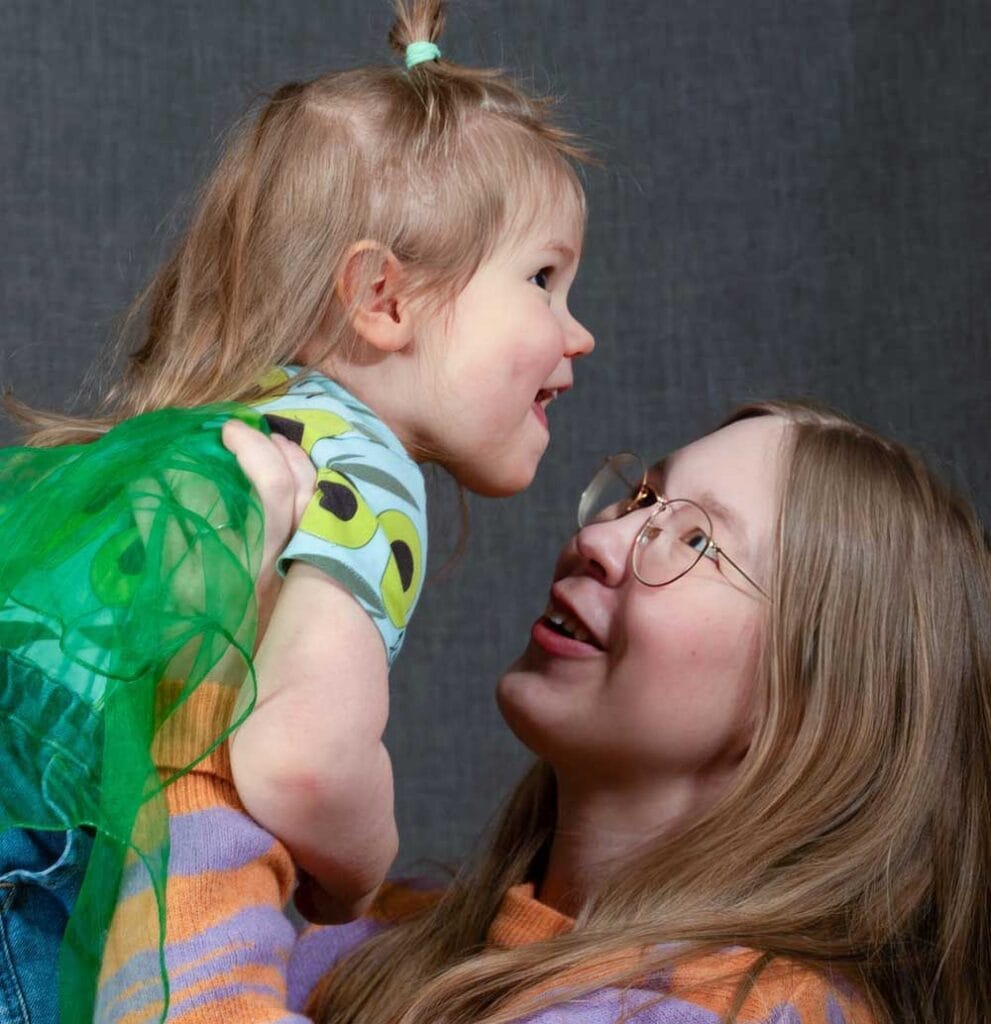
Family: child + adult
Music play school for families introduces the elements of music through song and play, together with your own adult. You can come with a parent, grandparent or other family member.
- Babies
- 1-year-olds
- 2-year-olds
Playgroups for 3-6 year olds
In the playgroup children gets used to making music alone and together through song and play. Groups are held without an adult.
- 3-year-olds
- 4-year-olds
- 5-year-olds
- 6-year-olds
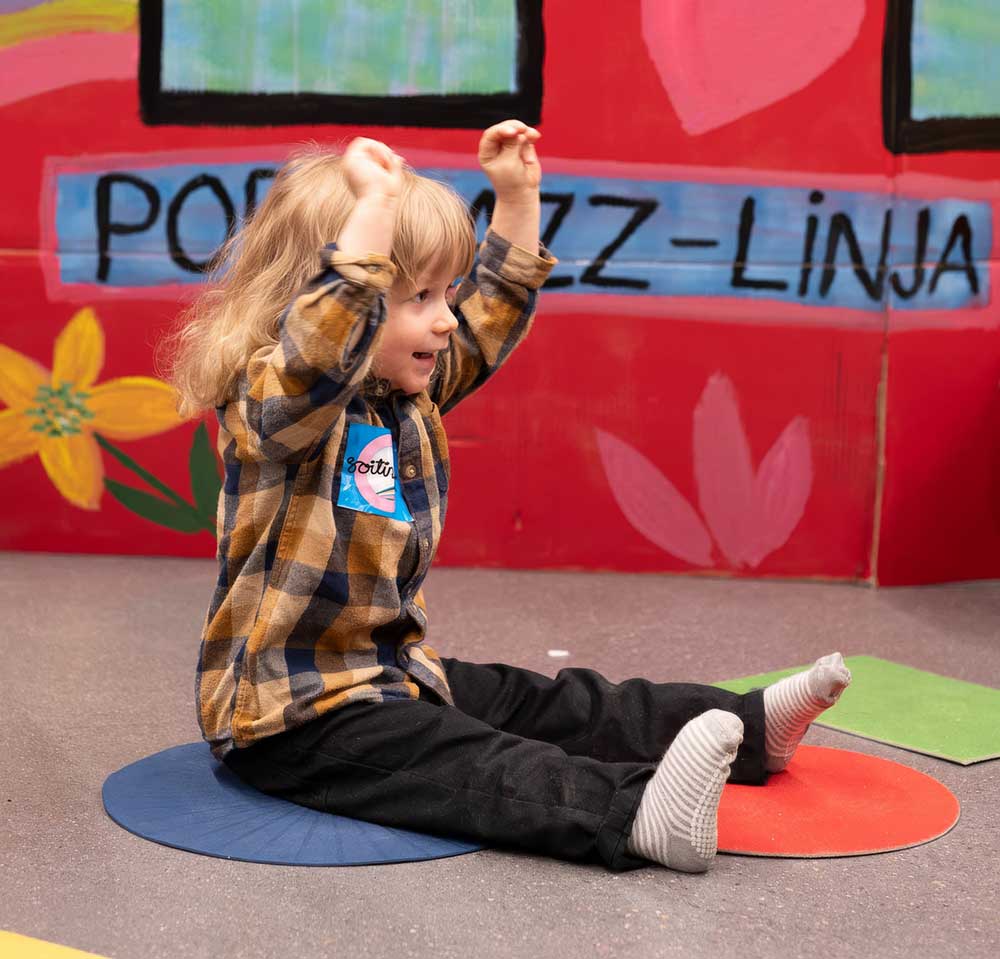
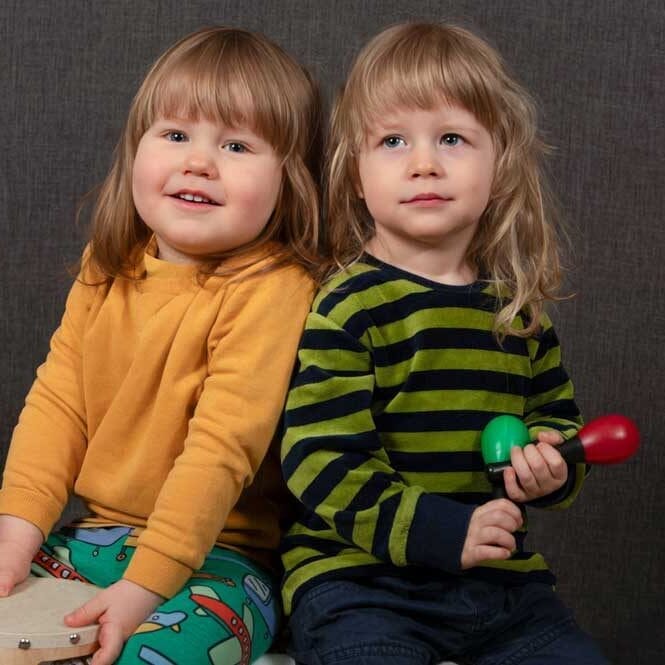
Music play school for siblings
Music play school for siblings is a music play school for families class, where several siblings can join the class with an adult. The classes offer the opportunity to make music together.
- Siblings 0-4 years
- Siblings 3-6 years
Instrumental music play school for 5-7 year olds
The instrumental music play school is an experiential way of getting to know an music instrument. In addition to your own instrument, you will play other melody, rhythm and band instruments and practice playing together, finding a common beat and listening to your fellow musicians.
In a musical instrument carousel, or instrument experiment, the child is introduced to several musical instruments, each for about 6-7 weeks. The carousel can be used as an aid when considering a possible future choice of instrument.
Instrumental music play school:
- Kantele
- Guitar
- Percussion instruments
- Recorder
- Piano
- Ukulele
- Instrument carousel
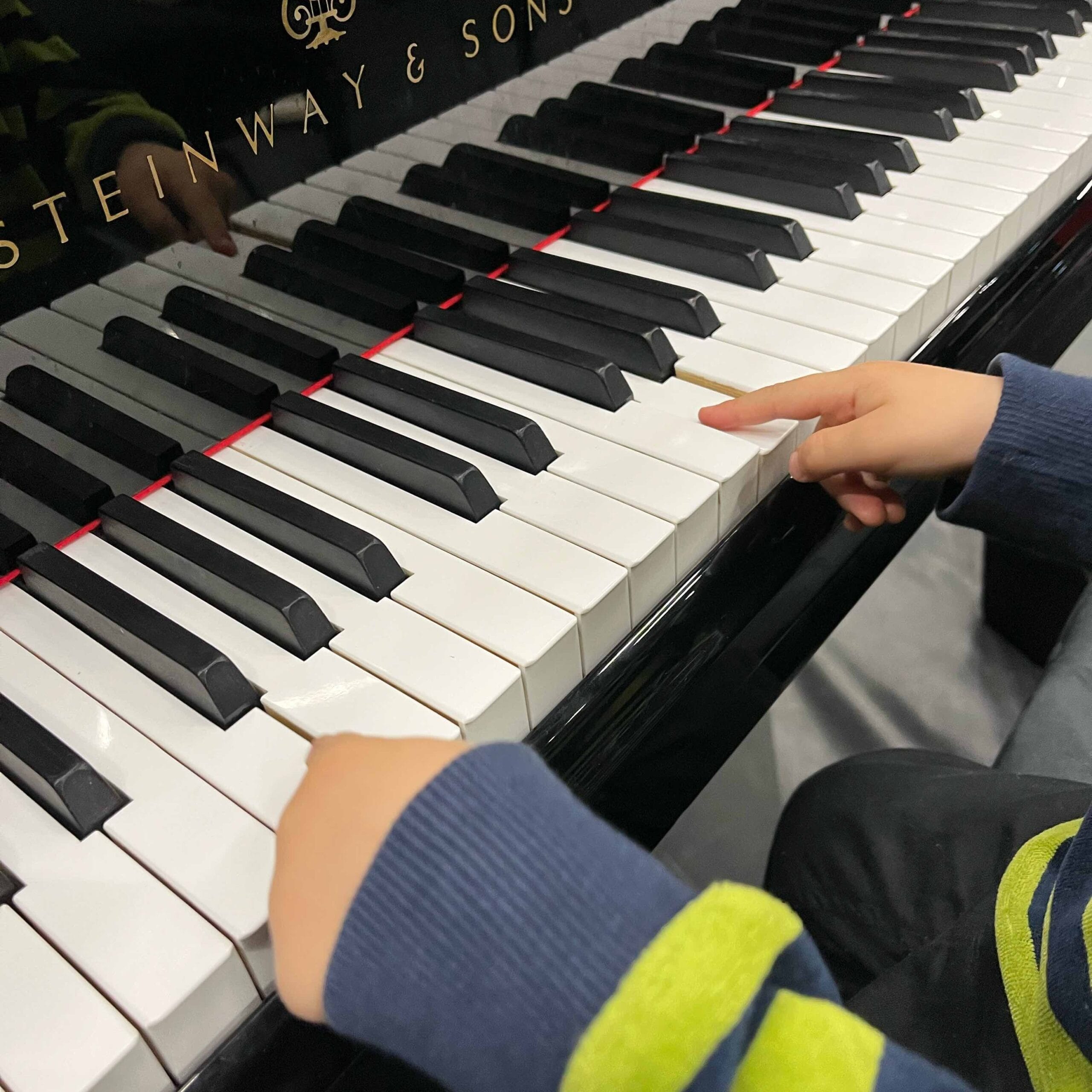
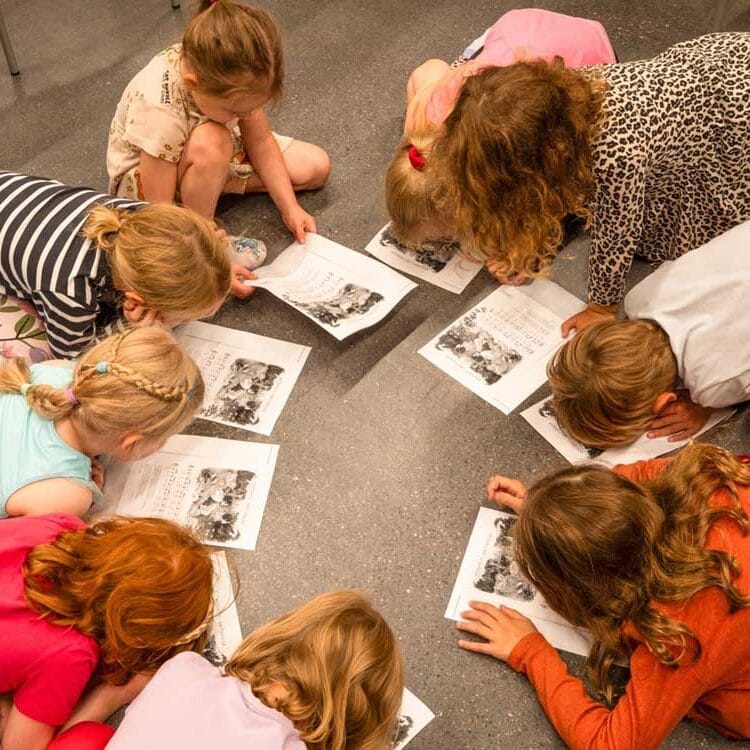
Music play school for kindergarten
Often music play school or other activities are after kindergarten. In the kindergarten music play school, a teacher from the Pop & Jazz Conservatory comes to the kindergarten to hold classes on the agreed days. One of the advantages of a daycare class is that during the day the children are at their most alert and learning is easier, and there is no need to transport the children after a long day at kindergarten and work.
The music play school for kindergarten follow the curriculum of the Pop & Jazz Conservatorys’ early music education programme, taking into account the wishes of the kindergarten. If they wish, the kindergarten staff can participate in the lessons with the children, giving the daycare staff ideas and tips for music education in the kindergarten.
How does music play school affect your child’s development?
Babies
Current research shows that even a newborn baby is a skilled listener of music and rhythm. The baby listens carefully, especially to the mother’s singing and speech, and is able to detect even small differences in rhythm and melody. A parent’s singing is the most important soundscape for a child.
Family bonding supports the interaction between the child and the adult through hugging and sensory play, and encourages and inspires the adult to make eye contact with the child. A calm atmosphere and listening environment is created, giving the child space to observe and experiment on their own and at their own pace.
1 year old
A 1-year-old wants to explore the world and his environment by actively moving around. This enthusiasm is supported in music play school through musical movement: learning different dances, finding different ways to move: walking, running, crawling, spinning and bouncing.
The child is practising doing things for themselves. Finger dexterity and eye-hand cooperation develop. Fine motor skills are developed, for example when handling musical instruments: the child is encouraged to try playing with the group (e.g. maracas, paddles, drums, drumsticks, tile instruments and his/her own body). The development of hand motor skills and the joyful experience of playing together provide a good basis for the development of a good musical relationship.
Singing and speaking skills continue to develop. The child experiences the joy and pulse of songs, songs and music by singing, moving, clapping and playing, both on their own and with an adult. Using multiple sensory channels (hearing, sight, touch and balance) and a variety of working methods, music learning is multidimensional and the lessons learned are effectively imprinted in both muscle memory and long-term brain memory.
Music activates parts of the brain that deal with emotions and helps your child learn to process them.
2 years old
A 2-year-old child is eager to try all sorts of things that other children and adults do. The child wants to play with other children, but has not yet mastered cooperative play. A child who is mobile and developing motor skills is encouraged to become increasingly independent as part of a group and is taught to follow and obey common instructions. The child is interested in everything the adult does and wants to be involved. At 2 years old, the child starts to use his imagination.
The child gradually puts words together in sentences and learns to understand the social nature of language. The words of the songs are catchy and the child is already imitating the songs at a brisk pace. The music play school builds up a repertoire of songs and lyrics. Music is still sketched together with an adult, but more independently.
3 years old
A 3-year-old child is agile when it comes to moving and climbing. Music play school involves a lot of movement – this helps to release energy during moments of concentration.
The child begins to have a wide vocabulary and produces speech that is understandable using child-like expressions. The child actively participates in conversations and tells about events – the child is also interested in different things and asks a lot of questions. Songs and song games with a wider and more complex vocabulary develop the child’s vocabulary and speech.
A variety of rhythmic songs are important to support your child’s speech development. Singing and chanting also help the child to articulate more clearly and develop speech intonation and memory.
Through stories, tales, fairy-tale characters, animals, pictures and exciting games, music play school supports the development of the child’s imagination and emotional expression through music. Through experiences and experiences, using all sensory channels and a variety of working methods, learning is more varied and deeper.
Music activates parts of the brain that deal with emotions and helps your child learn to process them. Different songs can help a child learn to understand different emotional states. Songs also help the child to develop empathy.
From the age of 3, children get used to being in music play school without an adult (except for sibling groups).
4 years old
A 4-year-old’s motor skills are developing rapidly. Hand skills and fine motor skills are developing and the child is practising, for example, drawing letters. The fine and gross motor skills of the hands also develop, for example in handling instruments, and at the same time, the child’s ensemble skills develop. In music play school the children play together with the group on instruments such as maracas, bells, drums, tile instruments and boomwhackers.
Language development is progressing and speech is becoming clear. The child explains events and experiences coherently. Music play school supports speech development, articulation, intonation and memory by encouraging the child to use his/her own voice in songs.
The child enjoys the company of his or her peers and is cooperative, even argumentative at times. The child asks lots of “why-how-when” questions and is interested in the meanings of different words. The child listens and tells long stories, sometimes mixing fact and fiction.
A 4-year-old loves role play. Stories, narratives, fairy tale characters, pictures and exciting games support the development of the child’s imagination and emotional expression through music. Through experiences, using all sensory channels and a variety of working methods, learning is more varied and deeper.
The child is beginning to understand the principle of waiting his/her turn, but he/she is not yet ready. In music play school, children get used to being in a group without an adult and also learn to follow common rules and to act as part of a group.
Musically, the aim is to find a common heartbeat in movement, singing and playing. The more developed fine and gross motor skills of the hands allow the use of more challenging body rhythms. Lessons include the repetition of echoes and rhythm patterns – these develop the child’s listening skills and memory, among other things. In musical movement, children practice more challenging movements that develop coordination and use dance and movement to outline the form of the music more precisely. A variety of listening games and exercises help the child to concentrate and distinguish sounds from the music they hear.
5-6 years old
A 5-6 year old is a more motor-developed, active and skilled mover. In musical movement, children practice more challenging movements that develop coordination, and through dance, movement and listening, they practice the form of music in more detail. In the classes, you will invent your own movements to express the music you hear.
In the music play school, children will move, sing, play, play body and rhythm instruments and listen to music, exploring music’s concept pairs (waltz-march, quietly-quietly, etc.), time signatures and the most common time signatures and their symbols (taa-aa, taa, ti-ti, 1/4 time, taa-aa-aa-aa, tiririr, tiririr, tiritii, half-time and full-time) in a holistic way.
The child’s speech is fluent and often flawless. The child loves to tell stories, and he or she will tell them in great detail. Music play school develops vocabulary and adds new songs to the song repertoire, as well as repeating songs learned in previous years. Advanced speech and pronunciation make it easier to sing and learn songs. The lessons encourage children to use their own voice in both songs and chants.
The general behaviour of a 5-6 year old child is more logical, controlled and independent than before. Cooperation with friends is more successful and music play school is a way of reinforcing group work skills, including music-making. Collaborative music making helps to develop the child’s socio-emotional skills. The child learns to listen to others and to wait for his/her turn.
The lessons are designed to practice maintaining a common pulse and repeated rhythmic ostinato patterns in movement, singing and playing. In addition rhythmic and melodic instruments are used.
Children are also encouraged to experiment, invent and improvise on their own. The child is already more ready to experiment with melodic instruments in terms of fine motor skills.
Music activates parts of the brain that deal with emotions, and a child listening to music learns emotional skills without realizing it. Different songs can help a child learn to understand different emotional states, and songs also help a child develop empathy.
For all age groups, music playschool can inspire a love of music, which is at its best an individual’s own resource throughout life and lays the foundations for future musical pursuits.
